Table of contents
The 14 Best Content Writing Tools to Try in 2026
In today’s digital world, creating impactful content is more important (and hard) than ever. Whether you’re a pro marketer or a starting writer – content writing tools can be a helping hand.
Content writing tools help marketers, writers, and social media managers streamline their workflow. They make it easier to produce high-quality, engaging content that connects with the target audience. These content creation tools are key for consistency, improving SEO, and, finally – boosting your brand’s visibility across platforms.
But with so many options, which ones are truly worth your time?
The best AI tools for content writing:
Let’s explore the 14 best tools that can take your own content to the next level!
01 Brand24
Brand24 is a media monitoring tool that helps you keep track of what people are saying about your brand, competitors, or any specific topic online.
It’s perfect for content writers who want to create data-driven articles and understand the buzz around certain topics.
I personally find it very helpful to get quotes and real-life discussions for my articles.
How can it help you?
- Find trending topics – you can see what’s currently gaining traction so you can jump on relevant content ideas.
- Monitor testimonials and reviews – you can find real insights into how people feel about your brand or product, which can be turned into powerful quotes in your content.
- Analyze sentiment – unsure if a topic will resonate? You can use Brand24 to check the sentiment around it before investing your time.
Example: Let’s say you’re writing a blog post about a specific influencer. Brand24 can pull up real discussions about them, showing you how they perform and giving you quotes to use in the article.
Here’s a quote about Hailey Bieber, a very popular celebrity and influencer:

Another use case of Brand24 for content creation is enabling to monitor how it spreads online.
By setting up a project for your brand, you can browse through the places you’ve been mentioned in, and it’s easier to find both – linked and unlinked mentions of your article.
It’s a great feature for backlinking!
Take a look. This is how I found out that my recent article was mentioned in a Tweet:

Thanks to that, I was able to join the discussion and boost its reach.
Key features:
- Trend and topic discovery
- Sentiment analysis
- Quotes and mentions finding
- Monitoring how the article spreads online and performs
Pros:
- Excellent for real-time content inspiration
- Helps validate content ideas with data
- Identifies key influencers to include in your content
- Monitors how the article spreads online
Cons:
- It can be overwhelming if you’re not used to data-driven content planning
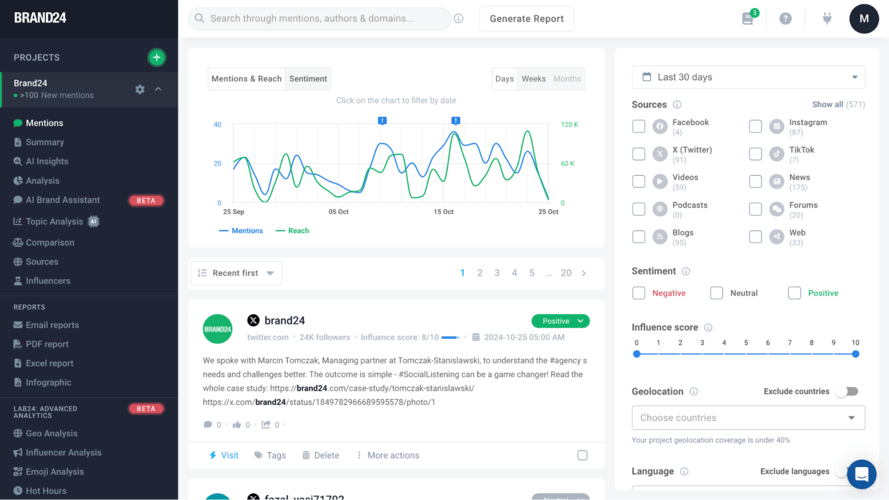
02 Surfer
Surfer is a tool for writing perfectly SEO-optimized content. It’s designed to help writers improve their content’s visibility on search engines.
It analyzes top-ranking pages and, based on that analysis – provides suggestions for keywords, structure, and length, helping you create content that ranks.
They designed their own “Content score” which simplifies working on optimizations. Simply said – the higher the score the better.
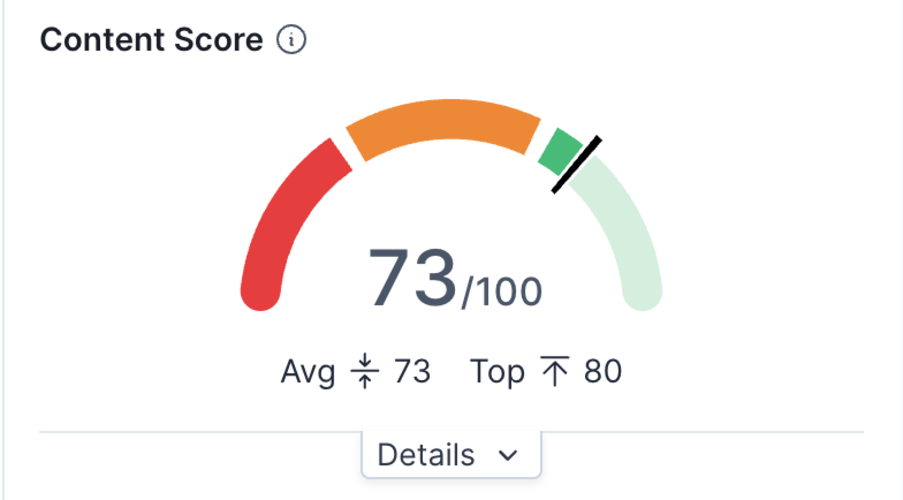
Plus, it’s also an AI writing tool!
The AI solutions from Surfer can either write a whole article for you or optimize your existing text to improve its score.
I personally used only the auto-optimization feature and had some mixed thoughts. Sometimes, the tool placed the keywords very well, but some didn’t make much sense.
So, if I decide to use this AI writing tool – I’ll need to check each change manually.
I also tested their newest release – Surfy, an AI Assistant, and have similar thoughts – it improves the work and usually gives good ideas, but you need to do the check-up.

How can it help you?
- Get suggestions for keyword density, headers, images, and even ideal word count based on what’s ranking on Google.
- Real-time optimization – as you write, Surfer provides a score based on how optimized your content is for your target keyword.
I think Surfer’s main advantage is that it turns SEO into a game. As you add keywords or improve your headings, your content score rises – it makes the process much more fun and efficient!
Key features:
- Keyword research and density analysis
- SERP analysis to see what competitors do
- Real-time content grading
- AI text generator
Pros:
- Perfect for writers who want their articles to rank
- Makes SEO guidelines easy to follow
- Visual, real-time optimization
- Provides chrome extension
Cons:
- It can be pricey for small teams
- Not the most intuitive for beginners
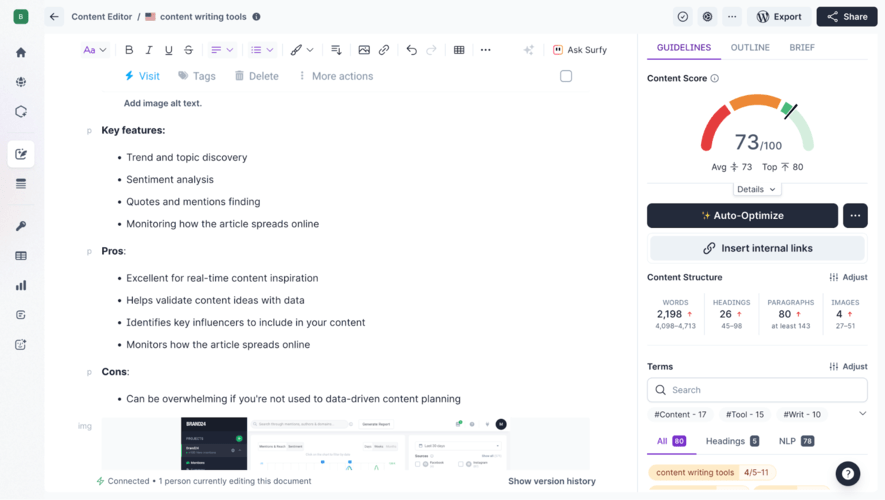
03 Semrush
Semrush is a marketing tool that offers many valuable insights into SEO optimization.
If you’re creating content that aims to perform well – this is your go to tool for a pre-writing analysis.
I personally use it mainly to analyze the competitor’s articles and keywords’ potential.
However, it’s also a fantastic option to track the performance of your article after publishing it.
Why do I like it?
It’s an all-in-one platform that gives you insights into your market and content strategy.
You can even track your competitors, see which keywords they’re ranking for, and identify gaps in your own content.
How can it help you?
- Find keywords that drive traffic, along with long-tail alternatives, to create more targeted content.
- Generate content – from social media captions to long-form content.
- Discover blog post ideas by analyzing competitors’ top content.
- Monitor the performance – check how the article performs after publishing (how many keywords it got, what is its position in search engines).
Plus, it recently launched its new AI writing tools. They can help you find new topics and write articles.
Here’s one of them:
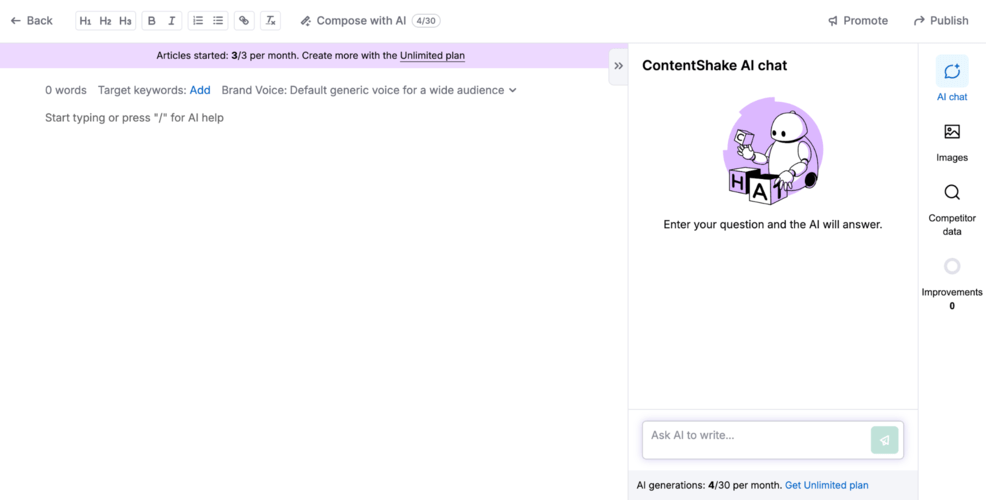
Key features:
- Topic and keyword research tool
- Monitoring the performance
- Backlink analysis
- Competitor analysis
Pros:
- Extremely powerful for large-scale content planning
- Useful for both SEO and content writers
- Wide range of marketing tools beyond content writing
Cons:
- Steep learning curve
- Expensive for individuals
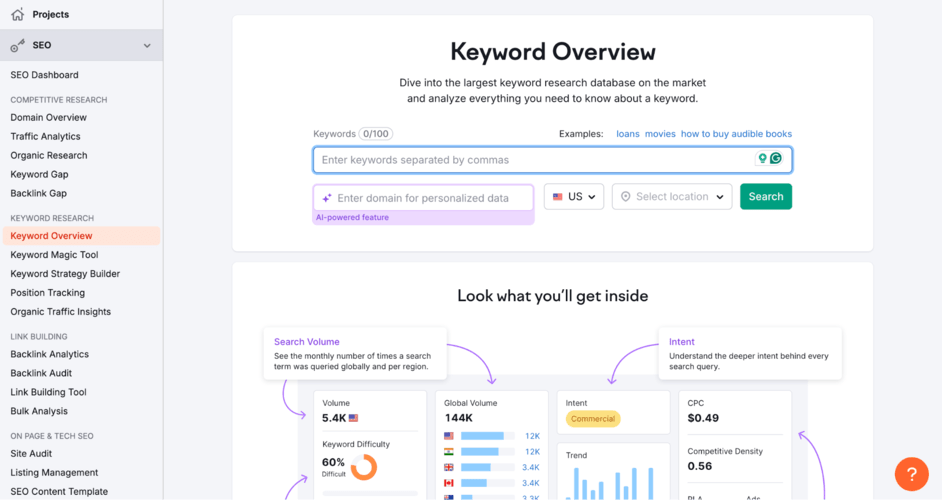
04 SE Ranking
If you want one tool that helps you handle modern SEO, from ranking tracking and keyword research to competitor analysis and writing and optimization. It’s a data-driven SEO and marketing platform designed for agencies and in-house teams to maintain visibility across search, AI, and social media.
What I find most impressive is that it includes an AI-powered Content Editor designed for teams that care about both creativity and performance. You can research topics, create detailed SEO-friendly briefs, write with AI, and track performance, right inside the same dashboard.
For instance, you can create SEO-friendly drafts in minutes – either step by step (with clear topic, tone, and structure settings) or in one click via built-in AI Writer. It analyzes top-ranking pages, suggests what to include, and gives you a real-time Content Score to show how well your text is optimized.
How can it help you?
- Generate articles, headings, FAQs, and meta tags – all SEO-optimized.
- Get live SEO insights based on real SERP data.
- Fine-tune with grammar, readability, originality, and plagiarism checks.
- Anti-AI detection that makes your text sound natural and human
- Track how your content performs after publishing.
- Use it with SE Ranking’s keyword, audit, and tracking tools for a full content workflow.
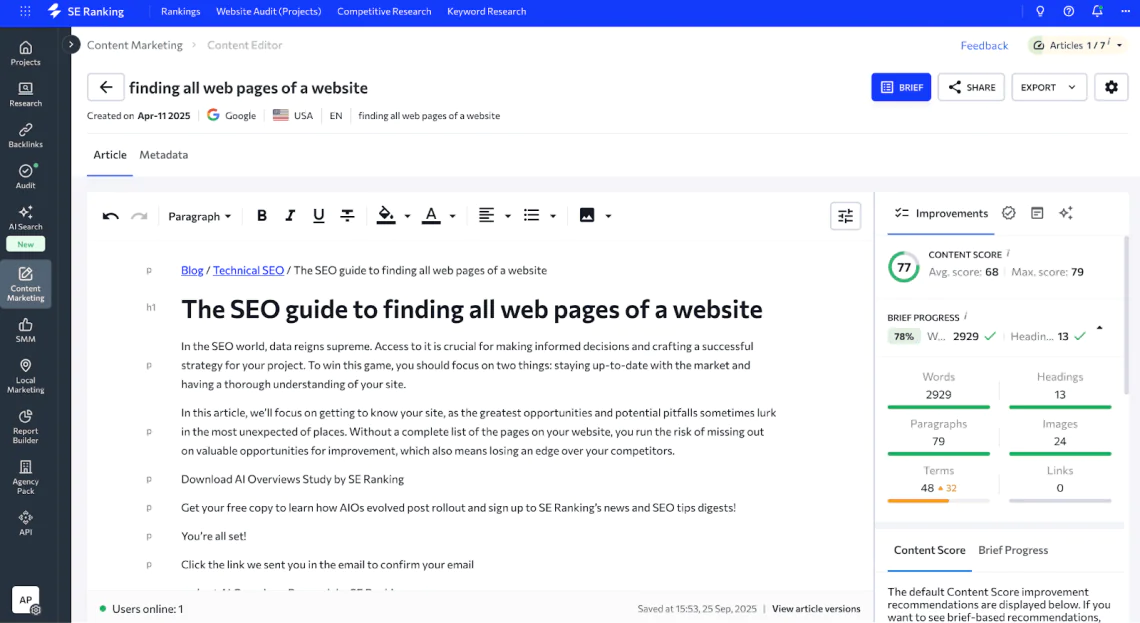
Key features:
- Guided or one-click AI article generation
- Tone control and content customization
- Real-time Content Score and SERP-based advice
- Grammar, readability, plagiarism, and anti-AI detection
- Google Docs and WordPress integration + performance tracking
Pros:
- Built for modern SEO workflows
- Combines writing, optimization, and analytics in one hub
- Easy to use yet built for professionals
- Excellent value – AI Writer + full SEO suite for under $100/month
Cons:
An add-on is required for higher limits
05 Writer
Writer is an AI writing tool that helps you create and edit content in real-time.
It’s perfect if you want to ensure brand consistency, tone, and style across all written content.
How can it help you?
- Get grammar and style corrections tailored to your brand’s voice and target audience.
- Ensure your content is original before publishing.
- Terminology management – create a glossary of approved terms for your team to use across all content.
What I find especially useful is the brand-specific style guide feature.
It helps to create articles that stay aligned with the brand’s voice without any extra hassle. It saves a lot of time and ensures consistency in content.
The interesting part of the tool is also its security.
Writer has its own Palmyra Language Learning Models, which is said to be “trained for business writing and business use cases”.
What it means? It basically offers higher security and transparency.
For example, Writer says Palmyra does not store your proprietary data for training its foundational models.
It’s a big advantage compared to other popular AI writing tools like ChatGPT or Perplexity.
Key features:
- AI text generator (from small copy to long-form content)
- Grammar and style correction
- Custom style guide creation
- Plagiarism detection
Pros:
- Perfect for maintaining brand voice
- Great for large teams with multiple content contributors
- Real-time editing assistance
Cons:
- Limited free version
- The AI-generated text often sounds fake
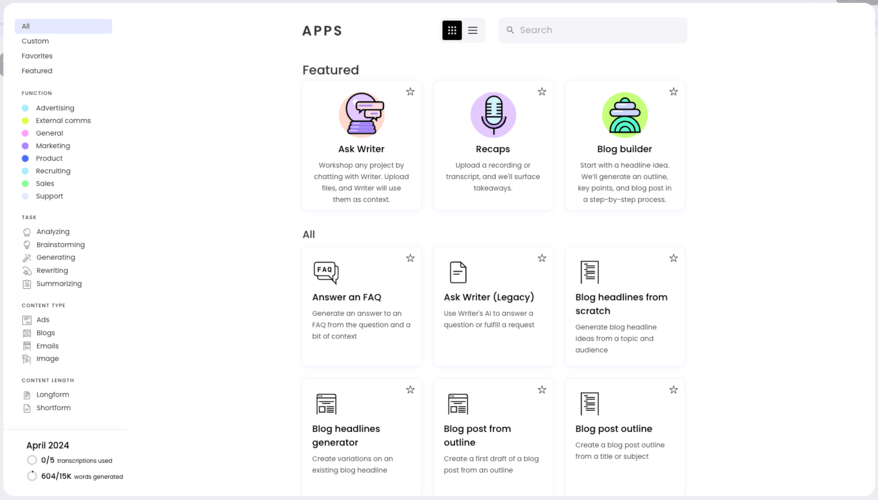
06 ChatGPT
ChatGPT is a versatile AI writing tool. It’s perfect for brainstorming, drafting, and creating content.
One of my favorite features is ChatGPT’s adaptability. It can help with everything from refining sentences to generating content ideas tailored to specific audiences.
Plus, it can even generate some really nice graphics!
How can it help you?
- Brainstorm for content ideas and writing.
- Generating images.
- Get real-time feedback on your content, writing style, or grammar.
- Simplify your writing and make it easier to understand for readers.
The most important part of using it effectively is creating the prompt. Here are my tips for writing one:
- Give ChatGPT a role (for example, a marketer or CEO) – he will write more accurately and better meet your needs.
- Be very specific – otherwise, you’ll likely get a generic piece.
- Provide examples and as much context as possible.
However, keep in mind that you’re giving that information away. Don’t include any confidential details!
Also, I love to use ChatGPT for opinions on the text that I already wrote. It usually gives me the edge I wouldn’t think of and helps me improve.
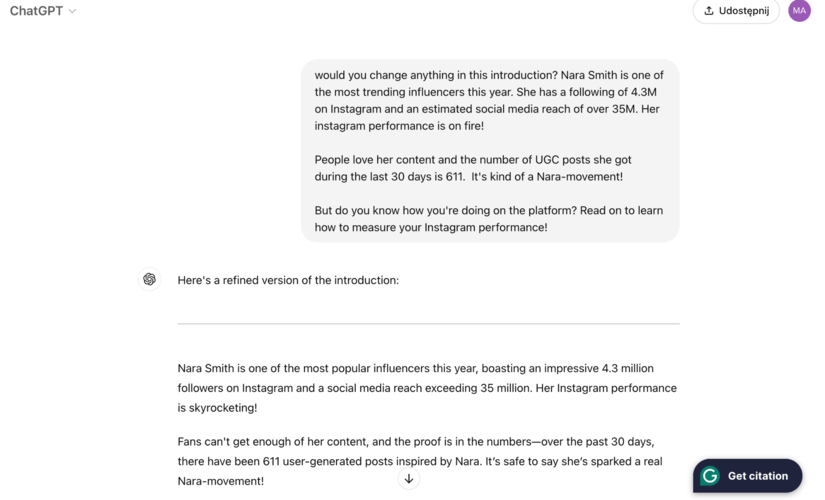
Key features:
- AI-powered writing and ideation assistance
- Versatile style and tone adjustment
- Content brainstorming and editing support
Pros:
- Adapts to different writing styles and tones
- Great for ideation and creating first drafts
- Improves responses according to the context of a discussion
- Generates images
- Integrates with Google docs (and Drive)
Cons:
- Requires clear and detailed prompts
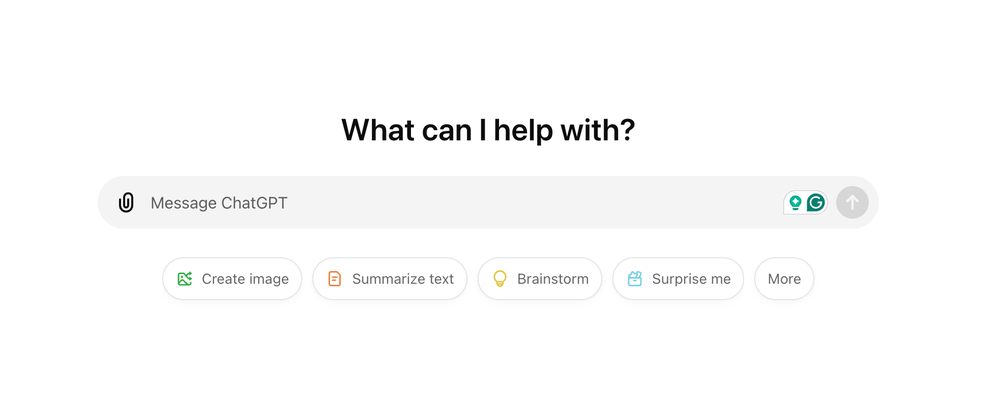
07 Grammarly
Grammarly is my go-to tool for polishing my language and maintaining a professional tone.
But, I rely on Grammarly not just for catching typos – also for its advanced suggestions on clarity and engagement.
It also offers a feature to automatically generate your text in a different tone – more professional, more natural, etc.
How can it help you?
- Eliminate grammar and style errors.
- Get feedback on clarity and engagement level.
- It integrates with apps and browsers, so you can have a check anywhere.
And Grammarly recently introduced an AI text and plagiarism detector. So you can have a final check there!
Whether you’re editing social media posts or long-form articles, Grammarly helps enhance readability and correctness.
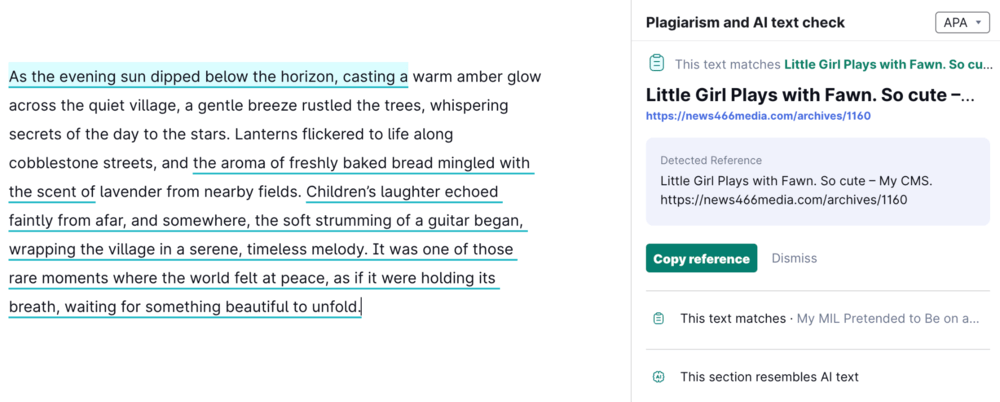
Key features:
- Real-time grammar, punctuation, and style suggestions
- Tone and clarity checks
- Integration with major content platforms
- AI text and plagiarism detector
Pros:
- Real-time grammar, style, and tone check-ups
- Detailed clarity and engagement insights
- Provides chrome extension
- Integrates with Google Docs
Cons:
- Premium plans can be costly
- Advanced features can feel intrusive to experienced writers
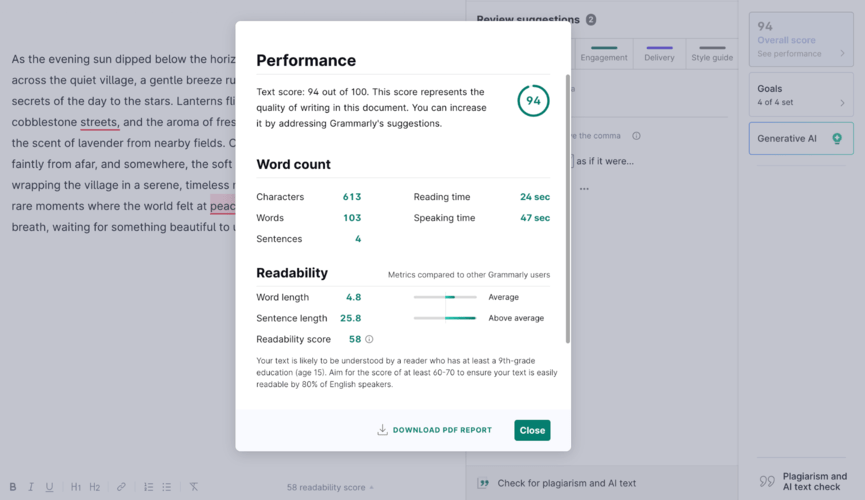
08 Ahrefs
Ahrefs is my ultimate tool for SEO analysis. And a standout feature is its backlink and competitor analysis.
It also offers a fantastic content editing tool. It’s similar to the Surfer’s one. It provides a content score and helps to optimize your writing for SEO.
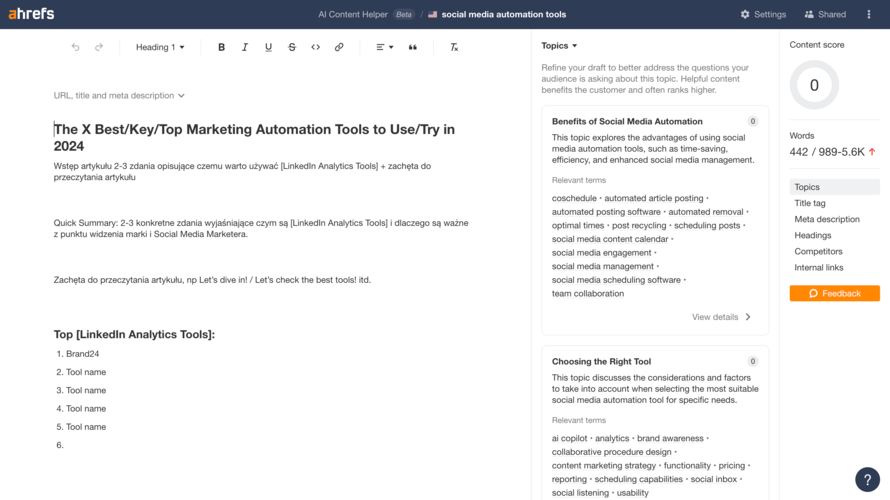
Simply put – Ahrefs helps marketers and content creators identify keywords, topics, and backlink opportunities for boosting SEO rankings.
Key features:
- Backlink tracking and analysis
- Keyword research with detailed metrics
- Site audit for SEO health and performance insights
Pros:
- Comprehensive backlink analysis and tracking
- Provides robust keyword insights with search volume
- In-depth site audits to improve SEO health
Cons:
- Expensive for individuals or small businesses
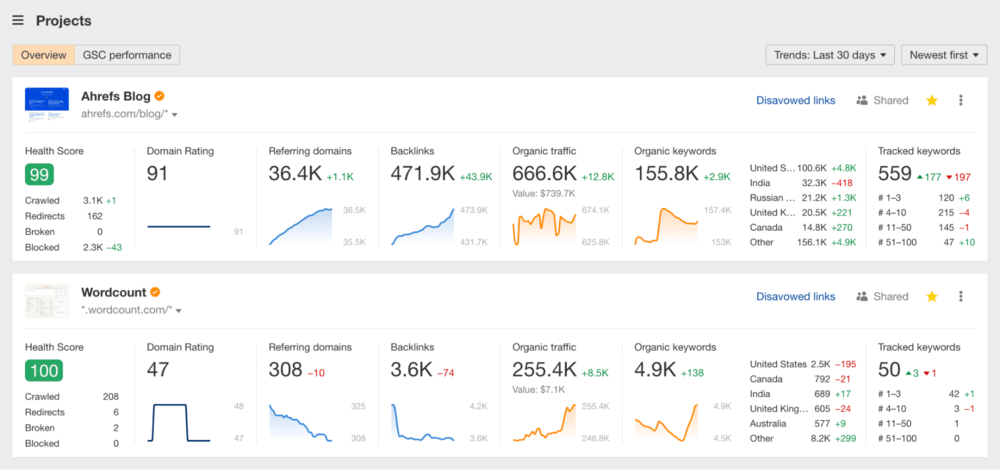
09 BuzzSumo
BuzzSumo is a content research tool that makes it easy to find trending topics and popular content in your niche.
How can it help you?
BuzzSumo is best for those who:
- Need content ideas based on trending topics
- Want to analyze content performance on social media
- Benefit from influencer insights for partnerships
I think BuzzSumo is a great tool for discovering what resonates with audiences. And this can help create better and more engaging content.
Key features:
- Trend tracking and topic discovery
- Social media performance metrics
- Influencer identification for potential collaborations
Pros:
- Great for discovering trending topics and engagement metrics
- Useful for competitor analysis and influencer research
Cons:
- Some features, like influencer analysis, are pricey
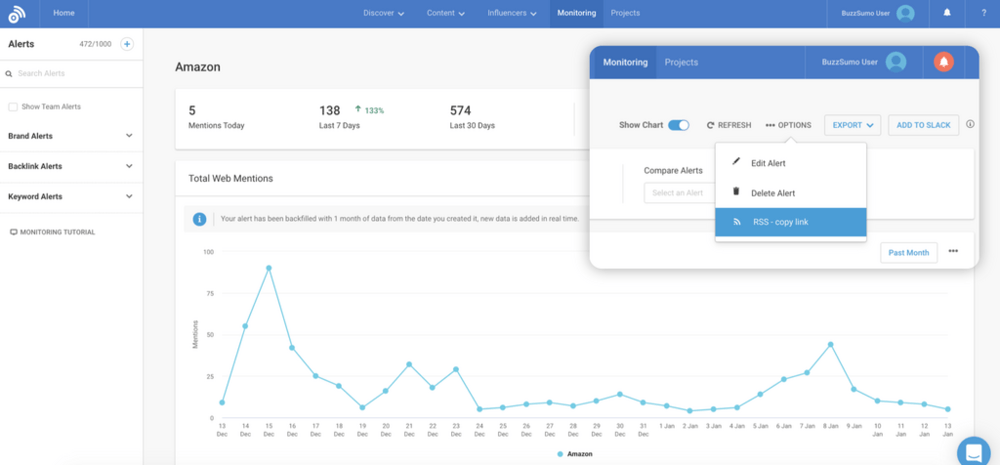
10 Copy.ai
Copy.ai is an AI content generator. It can help you create content for social media, blogs, and ads.
What I appreciate most about Copy.ai as AI writing software is how it tailors suggestions – it’s perfect for quick ideas when you’re stuck on the copy.
Plus, it’s very versatile and can generate both – short and long-form content.
How can it help you?
Copy.ai is best for those who:
- Need help crafting persuasive social media or ad copy
- Want an AI tool to streamline brainstorming
- Appreciate easy-to-use AI for writing assistance
And the best part – it’s a free tool.
Key features:
- AI-generated content
- Brainstorming capabilities for copy
- Social media posts and blog post writing
Pros:
- Quick content suggestions tailored to social media and ads
- User-friendly, especially for marketers in need of fast copy
- Generates content ideas with minimal input
Cons:
- Limited customization for long-form content
- May require refinement for nuanced topics

11 Headline Studio by CoSchedule
Headline Studio is a specialized tool for improving headlines that boost engagement.
I like how Headline Studio scores and guides on how to improve headlines. It helps you create headlines that resonate and drive clicks.
Headline Studio is valuable for writers who need consistent headline quality checks and engagement insights to improve their SEO results.
How can it help you?
Headline Studio is perfect for those who:
- Want to improve headline quality and engagement
- Need SEO-focused guidance for headline optimization
- Prefer a tool that provides real-time engagement scores
Key features:
- Headline analysis and scoring for engagement
- Suggestions for improving clarity and impact
- SEO-focused guidance for optimized headlines
Plus, it offers a free version with a few credits.
Pros:
- Scores your headlines for the best results
- Provides actionable suggestions for improvement
- SEO-focused headline optimization to boost traffic
Cons:
- Designed for headlines, so it has a limited scope
- Advanced features require a premium plan
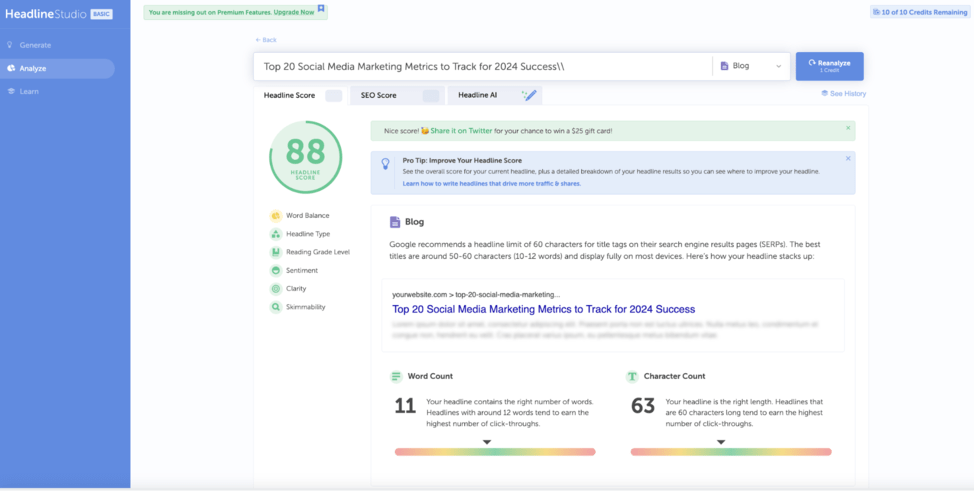
12 Jasper
Jasper is an AI-driven tool designed for content creation, with special templates for blogs, ads, and more.
I find Jasper useful for generating full drafts. It’s structured and adaptable to different tones and styles.
How can it help you?
Jasper is best for those who:
- Need versatile content generation for different formats
- Look for structured templates
- Want AI-based writing that adapts to brand tone
Key features:
- AI-powered content creation templates
- Tone adjustment for brand consistency
- Blog, ad, product descriptions, and social media templates
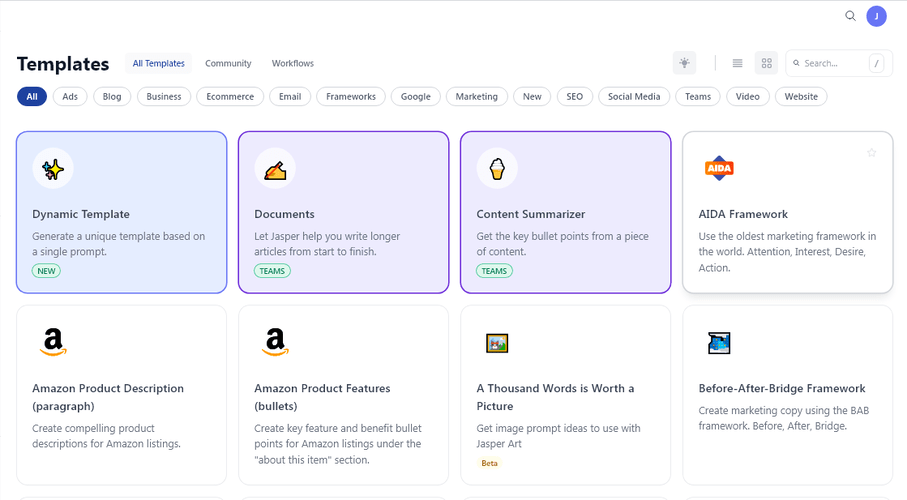
13 Gemini
Gemini is a tool similar to ChatGPT. Its main difference is that it perfectly scans Google and gives you responses based on this screening.
I appreciate Gemini’s fresh approach with a focus on reliable sources.
How can it help you?
Gemini is useful for those who:
- Want to ideate and draft content in one tool
- Need real-life examples
I also love to use this tool when writing a use case or real-life-based examples in my content. It can scan Google to help me find stories I can use in my writing.
Key features:
- AI-based chat that scans the web
- Content ideation and drafting
Pros:
- Offers reliable sources
- Brainstorming and ideation capabilities
- Great for finding real-life examples
- It has a free plan
Cons:
- It lacks depth, and sometimes the ideas aren’t relevant.
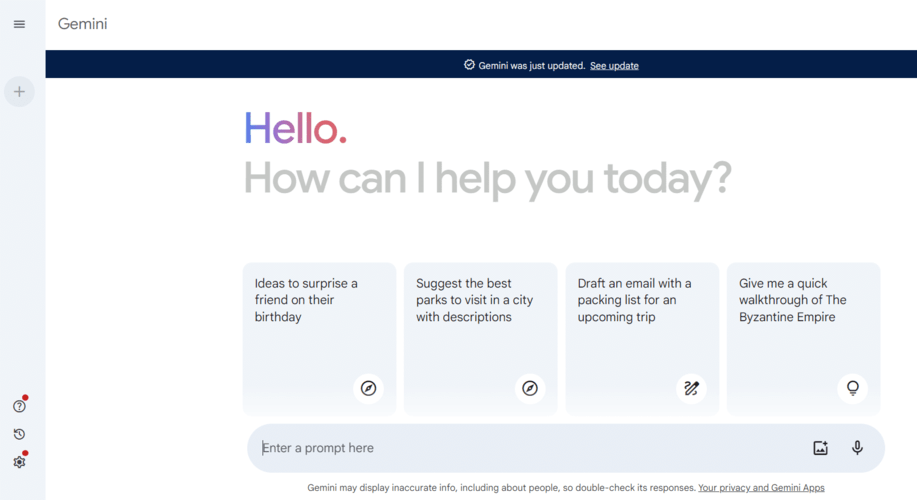
14 Frase
Frase is a content creation tool focused on creating detailed, research-based articles.
I used it as a research assistant and AI text generator. It makes long-form content feel manageable, offering data and statistics that back up the writing process.
How can it help you?
Frase is great for those who:
- Need research-based article drafting support
- Benefit from content outlines and topic suggestions
- Want to focus on quality with relevant data points
Key features:
- Research-based content assistance
- Content outline generator for easier drafting
- Keyword-based topic suggestions
Pros:
- Helps with long-form research-based articles
- Offers content outlines and topic suggestions
- Great for creating quality content backed by relevant data
Cons:
- Limited for short-form or quick copy needs
- Requires a subscription for advanced features
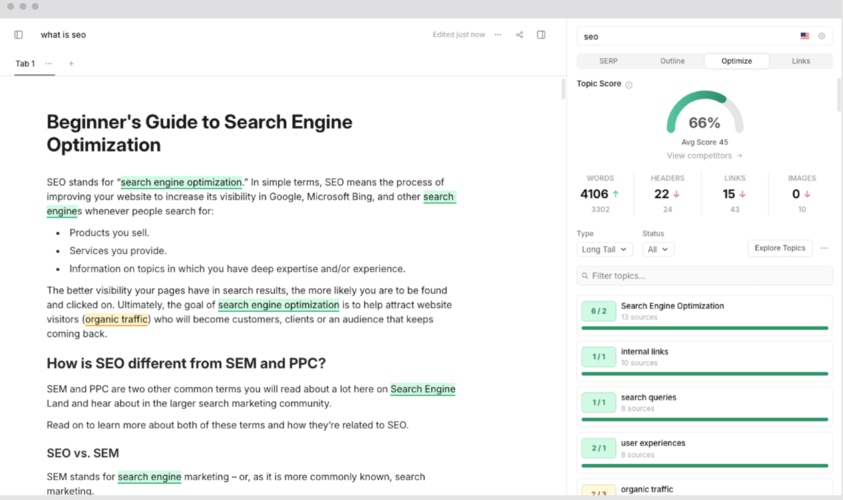
15 Sudowrite
Sudowrite is a content-writing tool designed for fiction writers. It helps you turn your ideas into full stories.
How can it help you?
It’s handy for anyone who wants to write to move the imagination but needs help bringing ideas to life.
Its interesting feature is sensory descriptions.
Why?
You can highlight any word or phrase. Click “Describe”, and get ready to use descriptions that include smells, sounds, or even metaphors.
Key features:
- Ability to generate AI text with specific genre and style
- Writing assistance
- Sensory descriptions
- Google Docs integration
Pros:
- Built specifically for fiction writers, with tools to help keep the creative flow going
- Visual tools like Canvas help you organize complex stories
- Google Docs integration lets you use Sudowrite’s features where you’re most comfortable writing
Cons:
- Best suited for fiction and longer projects, so it may not be ideal for non-fiction
- Subscription costs can be a barrier for some writers
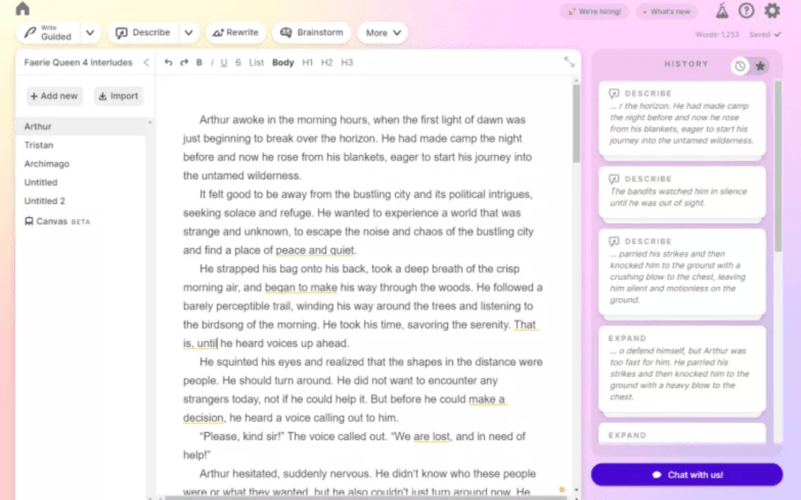
What are the most important features of a great content-writing tool?
When choosing a content writing tool, keep an eye out for these key features:
- AI text generation
AI can significantly improve your writing workflow and speed up the process of creating content. - SEO optimization
Tools that offer keyword research and on-page SEO guidance help ensure your content ranks. - Performance analysis
Understanding how your content performs helps you improve and create content that resonates more. - Real-time feedback
Instant style, grammar, or SEO suggestions are key for improving your writing without going back and forth. - Plagiarism detection
Ensuring originality is critical in content creation.
Conclusion
Content writing tools can help in your daily work. The most important part is choosing the ones that will answer your specific needs:
Brand24 stands out for its trend discovery and performance analysis, which helps writers create timely, relevant content.
For SEO and visibility, Surfer and Semrush are top-notch.
And Writer is a great choice for marketing teams that need branding and tone of voice consistency.
When you’re stuck on copy – try AI writing tools like ChatGPT or Gemini.
Final thoughts:
- The best tool for you depends on your specific needs.
- Don’t be afraid to combine tools – many of them complement each other and have smooth integration.
- Tools are just that – tools! They won’t replace creativity but can definitely help you work smarter, not harder.
Ready to give it a try? Start your free Brand24 trial and up your content writing game!




